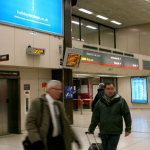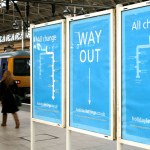Holidaylettings.co.uk has started 2010 with its biggest advertising campaign to date. The fast-growing firm chose mark-making* to create a national campaign aimed at rail users.
The bright blue posters are splashed across more than 60 stations around the UK, with Birmingham International and Manchester Piccadilly chosen as the two key “domination stations” to anchor the campaign.
The campaign concept is a simple but effective twist on railway signage. One poster plays with the standard ‘Way Out’ sign, while the other represents the holiday decision-making process as a rail map.
Steve Turner, creative director at mark-making*, explained: “The idea behind the campaign was to tell people that they don’t have to go down the package holiday route. Renting a holiday home means choice, freedom and the chance to enjoy your own space. Clever use of site-specific advertising, strong use of the corporate colours and a simple clean message help to fix the holidaylettings.co.uk brand in the minds of holiday makers.”
The team at holidaylettings.co.uk, currently the UK’s fastest-growing holiday home rental website, estimate that more than 50 million rail passengers will walk past the ads in January alone.
Sophie Peters, marketing executive at holidaylettings.co.uk, said: “Mark-making* did the creative for our 2009 campaign, which advertised to millions of people. That campaign brought us a 40% increase in booking enquiries. When we decided to do something even more ambitious for 2010, mark-making* was the obvious choice.”
This campaign follows 2009’s very successful London campaign that is probably best remembered for its taxi advertising, which covered cabs with sun, surf and beautiful people. Media Week loved the “cheeky idea” and “powerful execution”, but Bath and North East Somerset Council initially refused to allow the campaign to run on local taxis because it objected to the images of swimwear-clad sunbathers (of both sexes). However, after embarrassing attention from the Western Daily Press, council officials did a hasty U-turn and conceded: “The advertising covers the bare essentials of our licensing requirements.”


